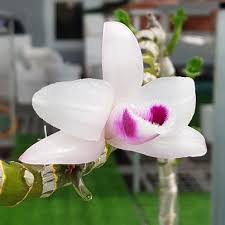# How to Organize a Workshop on Dendrobium Orchids for Beginners

Dendrobium orchids, particularly the beloved *Dendrobium nobile*, are among the most popular orchids for both novice and experienced growers. Their vibrant blooms, diverse varieties, and relatively straightforward care requirements make them an ideal subject for a beginner’s workshop. Organizing a successful workshop can help participants gain valuable knowledge and skills while fostering a community of orchid enthusiasts. This article provides a comprehensive guide on how to plan, promote, and execute an engaging and informative workshop on Dendrobium orchids for beginners.
## 1. Understanding Your Audience
### 1.1 Identifying the Target Audience
Before diving into the logistics of your workshop, it’s essential to understand who your audience is. The target participants may include:
– **Complete Beginners**: Individuals with little to no experience in growing orchids.
– **Casual Gardeners**: People who may have some gardening experience but are new to orchids.
– **Orchid Enthusiasts**: Those who are interested in expanding their knowledge about Dendrobium orchids specifically.
Understanding the audience will help tailor the content, activities, and materials to meet their needs.
### 1.2 Assessing Knowledge Levels
Consider conducting a pre-workshop survey to assess the knowledge levels and expectations of potential participants. This information can guide the content and structure of the workshop, ensuring it is both informative and engaging.
## 2. Planning the Workshop
### 2.1 Defining the Objectives
Set clear objectives for the workshop. What do you want participants to learn or achieve by the end? Some potential objectives may include:
– Understanding the basic care requirements of Dendrobium orchids.
– Learning about the different species and varieties of Dendrobium orchids.
– Gaining hands-on experience in potting and caring for orchids.
– Developing a network of fellow orchid enthusiasts.
### 2.2 Choosing a Date and Time
Select a date and time that accommodates your target audience. Consider factors such as:
– Weekdays vs. weekends: Many participants may prefer weekends for workshops.
– Time of day: Afternoon sessions may be more accessible for beginners.
Ensure the chosen date does not conflict with major local events or holidays that could affect attendance.
### 2.3 Selecting a Venue
Choosing the right venue is crucial for the success of your workshop. Consider the following options:
– **Community Centers**: Many local community centers have spaces that can accommodate workshops and are often cost-effective.
– **Botanical Gardens**: A botanical garden can provide a beautiful setting and may even have resources and staff to assist.
– **Local Nurseries**: Partnering with a local nursery can be mutually beneficial, as they may provide materials and expertise.
Ensure the venue has adequate seating, lighting, and necessary facilities (like restrooms and parking).
## 3. Designing the Workshop Agenda
### 3.1 Structuring the Content
A well-structured agenda will keep participants engaged and informed. Consider the following elements for your agenda:
#### 3.1.1 Introduction to Dendrobium Orchids
– Overview of the Dendrobium genus and its significance.
– Discuss different species and varieties of Dendrobium orchids, focusing on *Dendrobium nobile*.
#### 3.1.2 Basic Care Requirements
– **Light**: Explain the importance of light and the ideal conditions for Dendrobium orchids.
– **Watering**: Discuss the watering needs, including frequency and techniques.
– **Fertilization**: Provide guidance on the type of fertilizers to use and when to apply them.
– **Temperature and Humidity**: Outline the ideal temperature ranges and humidity levels for healthy growth.
#### 3.1.3 Hands-On Activities
– **Potting Demonstration**: Show participants how to pot a Dendrobium orchid, explaining the materials and tools needed.
– **Repotting Techniques**: Discuss when and how to repot orchids, including signs that indicate a plant needs repotting.
#### 3.1.4 Troubleshooting Common Issues
– Identify common problems such as pests, diseases, and environmental stress.
– Provide practical solutions and preventive measures.
#### 3.1.5 Q&A Session
Allocate time for participants to ask questions and clarify any doubts they may have.
### 3.2 Creating Engaging Materials
Develop engaging materials to enhance the workshop experience. Consider creating:
– **Handouts**: Provide printed materials summarizing key points, care instructions, and resources for further reading.
– **Visual Aids**: Use slideshows, posters, or videos to illustrate concepts and keep participants engaged.
– **Demonstration Plants**: Use live plants to demonstrate care techniques, ensuring participants can see the plants up close.
## 4. Promoting the Workshop
### 4.1 Creating Promotional Materials
Effective promotion is essential to attract participants. Consider the following promotional materials:
– **Flyers**: Create eye-catching flyers with essential workshop details and distribute them in local nurseries, community centers, and libraries.
– **Social Media Posts**: Utilize platforms like Facebook, Instagram, and Twitter to promote the workshop. Consider creating an event page for easy registration and updates.
– **Email Campaigns**: If you have an existing mailing list, send out an announcement detailing the workshop and its benefits.
### 4.2 Utilizing Local Media
Reach out to local newspapers, radio stations, and community blogs to promote your workshop. Providing them with press releases can help generate interest and attendance.
## 5. Preparing for the Workshop
### 5.1 Gathering Materials
Ensure you have all the necessary materials for the workshop, including:
– **Orchids and Potting Supplies**: Secure a sufficient number of Dendrobium orchids for participants to pot during the hands-on activity.
– **Tools**: Provide tools such as pots, potting mix, scissors, and watering cans.
– **Educational Materials**: Print handouts and prepare visual aids ahead of time.
### 5.2 Setting Up the Venue
Arrive early on the day of the workshop to set up the venue. Arrange seating in a way that encourages participation and interaction. Ensure that materials are organized and easily accessible.
## 6. Conducting the Workshop
### 6.1 Welcoming Participants
As participants arrive, greet them warmly and provide name tags to foster a friendly environment. This personal touch can help build rapport among attendees.
### 6.2 Engaging Participants
Throughout the workshop, engage participants by encouraging questions, discussions, and sharing their experiences. Use interactive activities to keep the atmosphere lively.
### 6.3 Facilitating Hands-On Activities
During hands-on activities, provide guidance and support to participants as they pot their orchids. Offer individual attention to those who may need assistance.
## 7. Follow-Up After the Workshop
### 7.1 Collecting Feedback
After the workshop, gather feedback from participants to assess the effectiveness of the event. Consider using:
– **Surveys**: Distribute surveys that ask participants about their experience, content clarity, and suggestions for improvement.
– **Informal Conversations**: Encourage informal conversations to gather insights and gauge participants’ satisfaction.
### 7.2 Providing Additional Resources
Send follow-up emails to participants, thanking them for attending and providing additional resources. This may include:
– **Care Guides**: Share digital copies of care guides and other educational materials.
– **Links to Online Communities**: Encourage participants to join online forums or social media groups focused on orchid care.
– **Upcoming Events**: Inform them about any future workshops or events related to orchids.
## 8. Building a Community
### 8.1 Encouraging Ongoing Engagement
Encourage participants to stay engaged with each other and continue their learning journey. Consider establishing:
– **Social Media Groups**: Create a dedicated group where participants can share their progress, ask questions, and support each other.
– **Monthly Meetups**: Organize regular meetups for participants to share their experiences, swap plants, and learn from guest speakers.
### 8.2 Celebrating Success
Acknowledge the progress participants make in their orchid-growing journeys. Celebrate successes by featuring participants’ orchids on social media or organizing small competitions.
## 9. Conclusion
Organizing a workshop on Dendrobium orchids for beginners can be a fulfilling experience that fosters community, knowledge sharing, and a love for gardening. By following these steps, you can create an engaging and informative workshop that empowers participants to care for their orchids with confidence.
As attendees leave your workshop with newfound skills and a sense of camaraderie, you will have contributed to a growing community of orchid enthusiasts dedicated to preserving the beauty and diversity of Dendrobium orchids. Embrace the opportunity to inspire others and nurture a passion for these exquisite plants, creating a lasting impact in the world of horticulture.

